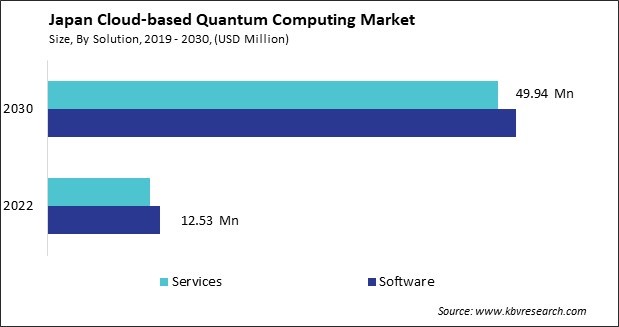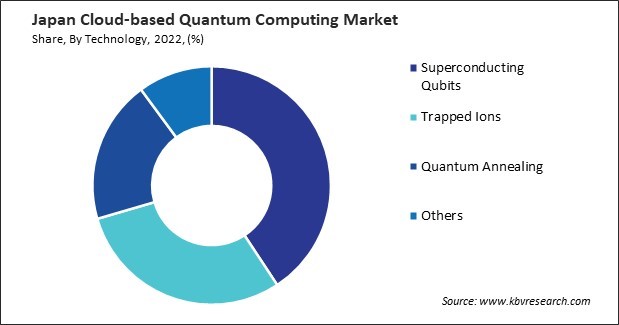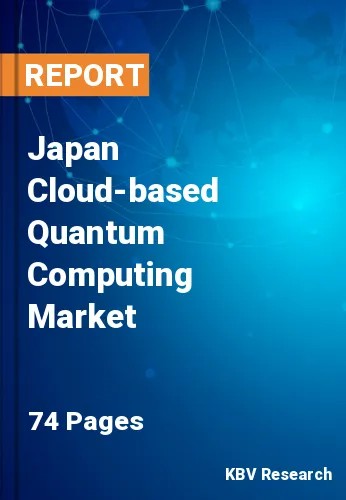The Japan Cloud-based Quantum Computing Market size is expected to reach $101.87 Million by 2030, rising at a market growth of 20.1% CAGR during the forecast period.
Japan's cloud-based quantum computing market has witnessed significant growth and innovation in recent years. One of the primary drivers behind this growth is the strong emphasis on research and development in quantum technologies by both government and private sector entities. Japan has a long history of pioneering research in fields such as quantum mechanics, which provides a solid foundation for advancements in quantum computing.

In recent years, Japan has witnessed a surge in public and private investment in quantum computing research and development. Government initiatives, such as the Quantum Leap Flagship Program launched by the Japanese government in 2017, aim to accelerate quantum technology research and development with a focus on practical applications. These initiatives provide funding and resources to support collaborative projects between academia, industry, and government agencies, fostering a conducive environment for quantum innovation.
Furthermore, businesses' increasing adoption of cloud-based quantum computing solutions across various sectors is driving industry growth in Japan. Industries such as finance, healthcare, logistics, and materials science are exploring the potential of quantum computing to solve complex problems and gain a competitive edge. Cloud-based quantum computing platforms offer these businesses access to powerful computing resources without significant upfront investment in infrastructure.
However, Japan's cloud-based quantum computing market has also been impacted by the COVID-19 pandemic. The pandemic has disrupted supply chains, delayed research projects, and caused economic uncertainty, which has affected the pace of growth in the quantum computing sector. Additionally, the shift to remote work and the prioritization of essential services have redirected resources away from non-essential projects. With continued investment in research and development and collaboration between industry, academia, and government, Japan is well-positioned to maintain its leadership in the cloud-based quantum computing market and drive further advancements in this transformative technology.
The pharmaceutical sector in Japan is experiencing a transformative shift driven by the rising adoption of cloud-based quantum computing technology. One of the key advantages of cloud-based quantum computing in the pharmaceutical sector is its ability to expedite drug discovery. According to the Japan Ministry of Health, Labour and Welfare (MHLW), the Japanese pharmaceuticals industry in 2021 totaled $106 billion. By leveraging quantum algorithms, researchers in Japan explore vast chemical compound libraries and identify potential drug candidates in a fraction of the time required by classical computing methods.
Moreover, cloud-based quantum computing offers pharmaceutical companies access to scalable computational resources without significant upfront investments in infrastructure. This accessibility democratizes quantum computing power, allowing large pharmaceutical corporations and smaller biotech firms in Japan to harness its innovation potential. Cloud-based platforms also facilitate collaboration and knowledge-sharing among researchers, enabling cross-disciplinary teams to tackle complex challenges collaboratively.
Furthermore, quantum computing holds promise for optimizing molecular structures and predicting their properties with greater precision. By leveraging quantum algorithms for molecular simulation and optimization, Japanese researchers streamline the process of identifying lead compounds and predicting their pharmacological properties, leading to more efficient drug development pipelines. Therefore, adopting cloud-based quantum computing technology in Japan's pharmaceutical sector promises to revolutionize drug discovery, democratize access to computational power, and enhance molecular structure optimization for more efficient drug development pipelines.
In recent years, the proliferation of quantum computing has sparked concerns about the security of traditional cryptographic systems. As quantum computers advance in power and accessibility, their potential threat to existing encryption methods has become increasingly evident. This concern is particularly pronounced in Japan, a country known for its cutting-edge technology and robust cybersecurity landscape. In response to this emerging threat, there has been a growing demand for quantum-safe cryptography within Japan's cloud-based quantum computing market.
One of the primary drivers behind this demand is the recognition of the inherent vulnerability of current cryptographic standards, such as RSA and ECC, to attacks from quantum computers. Unlike classical computers, quantum computers leverage the principles of quantum mechanics to perform calculations exponentially faster, rendering many existing encryption techniques obsolete. This realization has prompted businesses and government agencies in Japan to seek alternative cryptographic solutions that withstand the power of quantum computing.
Furthermore, the rapid advancement of quantum technology, coupled with the increasing accessibility of quantum computing resources through cloud-based platforms, has accelerated the urgency for quantum-safe cryptography. With quantum computing becoming more prevalent, the window of vulnerability for traditional encryption methods continues to narrow, driving organizations to prioritize the adoption of quantum-resistant encryption algorithms.
Moreover, Japan's strong emphasis on cybersecurity and technological innovation has fueled the demand for quantum-safe cryptography. Recognizing the strategic importance of maintaining secure communications and protecting sensitive data, Japanese enterprises proactively explore quantum-resistant encryption solutions to future-proof their digital infrastructure. Therefore, Japan's tech-savvy landscape is driving a surge in demand for quantum-safe cryptography to safeguard sensitive data and secure communications.

The cloud-based quantum computing market in Japan is experiencing rapid growth and innovation as companies harness the potential of quantum technology to drive advancements in various industries. Japan, known for its prowess in technology and innovation, is home to several key players in the cloud-based quantum computing market, each contributing to the development and commercialization of cloud-based quantum solutions.
One prominent company in cloud-based quantum computing market is D-Wave Systems, a Canadian quantum computing company that has established a presence in Japan. D-Wave offers cloud-based access to its quantum processing units (QPUs) through the Leap quantum cloud service. By providing access to quantum computing resources via the cloud, D-Wave enables Japanese businesses and researchers to explore quantum algorithms and applications without significant upfront investment in hardware.
Another major player in the Japanese cloud-based quantum computing market is Fujitsu, a leading multinational information technology company headquartered in Tokyo. Fujitsu has invested in quantum computing research and development, aiming to leverage quantum technology to solve complex computational problems more efficiently. Fujitsu offers access to quantum-inspired algorithms and solutions through its cloud services, enabling Japanese enterprises to optimize processes and drive innovation.
NEC Corporation, a Japanese multinational information technology and electronics company, is also active in the quantum computing space. The company is conducting research and development in quantum computing, focusing on areas such as quantum cryptography, quantum annealing, and quantum algorithms. By integrating quantum computing capabilities into its cloud services, NEC aims to empower Japanese businesses with advanced computational capabilities to tackle challenges in diverse domains.
Additionally, startups like QunaSys significantly contribute to the Japanese cloud-based quantum computing market. QunaSys specializes in quantum algorithm development and optimization, offering cloud-based access to its quantum computing resources and expertise. With a focus on addressing real-world problems in fields such as drug discovery, materials science, and finance, QunaSys is driving innovation and collaboration in the Japanese quantum computing ecosystem. With increasing investments in quantum research and development and advancements in cloud infrastructure, japan is well-positioned to play a leading role in the global quantum computing landscape, shaping the future of technology and innovation.
By Solution
By Technology
By Application
By Vertical
Our team of dedicated experts can provide you with attractive expansion opportunities for your business.

